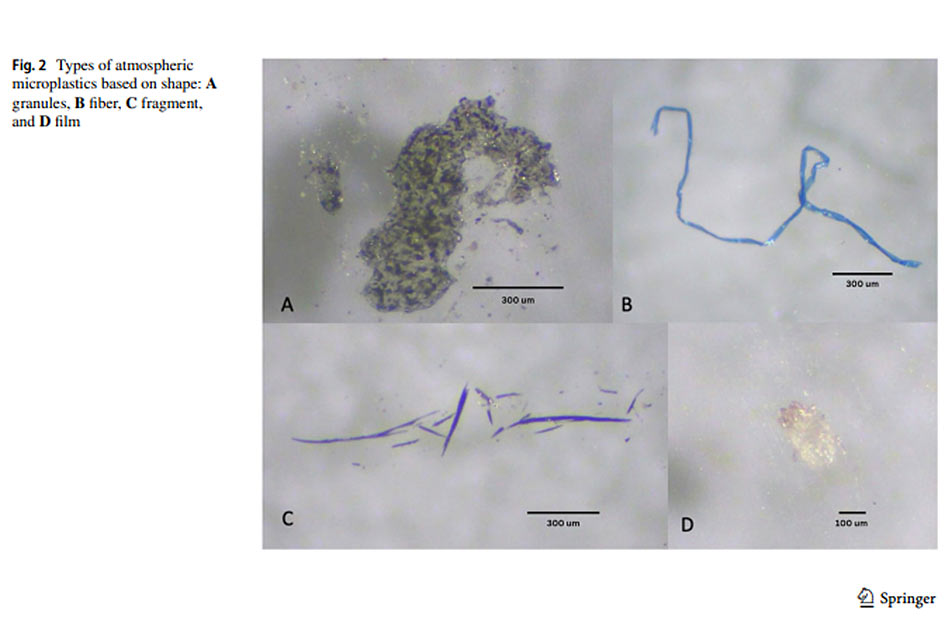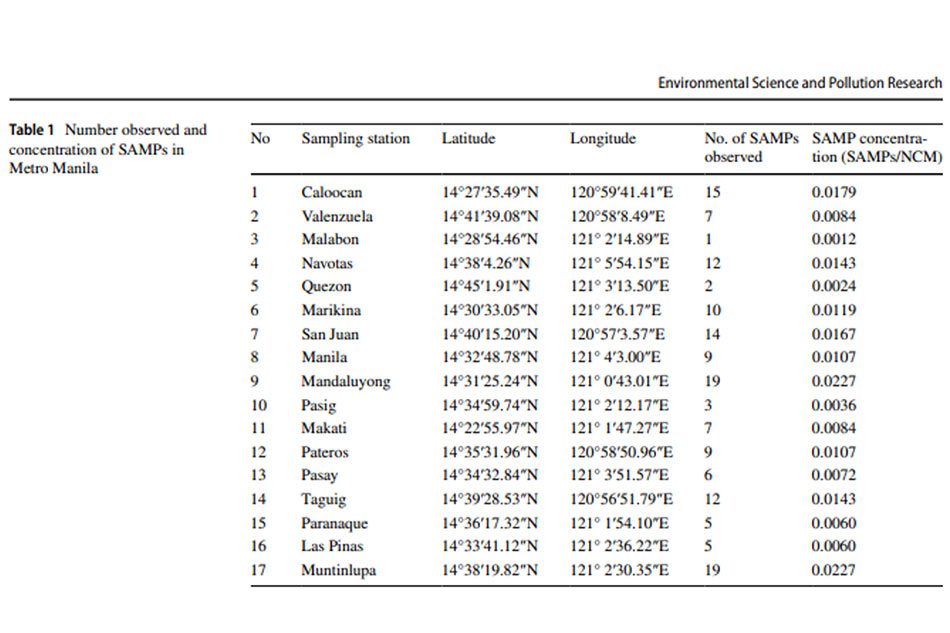How microplastics may affect health | ABS-CBN

Welcome, Kapamilya! We use cookies to improve your browsing experience. Continuing to use this site means you agree to our use of cookies. Tell me more!
How microplastics may affect health
How microplastics may affect health
Josiah Antonio,
ABS-CBN News
Published May 17, 2023 06:04 PM PHT
MANILA — Microplastics found floating in the air in Metro Manila pose potential health risks, a researcher warned.
MANILA — Microplastics found floating in the air in Metro Manila pose potential health risks, a researcher warned.
A group of Filipino scientists recently flagged the presence of suspended atmospheric microplastics in all 16 cities and 1 municipality in the capital region, with the highest concentration observed in Muntinlupa and Mandaluyong in 2021.
A group of Filipino scientists recently flagged the presence of suspended atmospheric microplastics in all 16 cities and 1 municipality in the capital region, with the highest concentration observed in Muntinlupa and Mandaluyong in 2021.
The human body cannot break down microplastics, which could cause stress to cells, said one of the researchers, Mindanao State University — Iligan Institute of Technology professor Hernando Bacosa.
The human body cannot break down microplastics, which could cause stress to cells, said one of the researchers, Mindanao State University — Iligan Institute of Technology professor Hernando Bacosa.
"Kapag stressed ang cells, nagiging abnormal 'yung function niya, usually oxidative stress. Puwede siyang mag-cause ng cancer in the long run," Bacosa said in an interview with ABS-CBN News.
"Kapag stressed ang cells, nagiging abnormal 'yung function niya, usually oxidative stress. Puwede siyang mag-cause ng cancer in the long run," Bacosa said in an interview with ABS-CBN News.
ADVERTISEMENT
(When cells are stressed, they function abnormally, usually due to oxidative stress. It can cause ng cancer in the long run.)
(When cells are stressed, they function abnormally, usually due to oxidative stress. It can cause ng cancer in the long run.)
"Ang microplastic kasi kapag nasa hangin, palutang-lutang, pwede diyang dumikit ang mga bacteria, pwede ring dumikit 'yung mga viruses, pwedeng dumikit 'yung mga heavy metals, pwedeng dumikit 'yung mga nakakalason na heavy compound," he added.
"Ang microplastic kasi kapag nasa hangin, palutang-lutang, pwede diyang dumikit ang mga bacteria, pwede ring dumikit 'yung mga viruses, pwedeng dumikit 'yung mga heavy metals, pwedeng dumikit 'yung mga nakakalason na heavy compound," he added.
(When microplastics float in the air, bacteria, viruses, heavy metals and poisonous heavy compounds could stick to them.)
(When microplastics float in the air, bacteria, viruses, heavy metals and poisonous heavy compounds could stick to them.)
Microplastics come from plastics crushed into mostly invisible pieces about 0.5 millimeters or smaller.
Microplastics come from plastics crushed into mostly invisible pieces about 0.5 millimeters or smaller.
"Through time mas nagiging maliit ito na hindi na natin nakikita, kailangan na ng microscope at magiging bahagi na ito ng buhangin, pwede na itong lumutang sa tubig, pwedeng kainin ng isda, pwede 'yang ilipad ng hangin at pwede nating mahinga," Bacosa said.
"Through time mas nagiging maliit ito na hindi na natin nakikita, kailangan na ng microscope at magiging bahagi na ito ng buhangin, pwede na itong lumutang sa tubig, pwedeng kainin ng isda, pwede 'yang ilipad ng hangin at pwede nating mahinga," Bacosa said.
(Over time, you will need a microscope to see it. It could mix with the sand, float in the water, get consumed by fish, or inhaled by people.)
(Over time, you will need a microscope to see it. It could mix with the sand, float in the water, get consumed by fish, or inhaled by people.)
The professor said studies on the effects of microplastics and accompanying contaminants are underway.
The professor said studies on the effects of microplastics and accompanying contaminants are underway.
"Aside from the effect ng mga microplastics itself, 'yung effect ng mga contaminant na 'yun na sumasakay sa mga microplastics ang mas may nakakabahalang epekto sa katawan ng tao at hindi pa natin alam 'yun as of the moment," he said.
"Aside from the effect ng mga microplastics itself, 'yung effect ng mga contaminant na 'yun na sumasakay sa mga microplastics ang mas may nakakabahalang epekto sa katawan ng tao at hindi pa natin alam 'yun as of the moment," he said.
(The effects on the human body of contaminants that stick to microplastics are more worrying and we are not yet certain of them as of the moment.)
(The effects on the human body of contaminants that stick to microplastics are more worrying and we are not yet certain of them as of the moment.)
Bacosa also urged the public to cut down on plastic use.
Bacosa also urged the public to cut down on plastic use.
"Kapag andiyan ang plastic, andiyan ang pollution. We have to manage our waste, change of lifestyle, minimize the use of plastic. Huwag nating basta-basta itapon kahit saan lang 'yung plastic, dapat itapon sa tamang lalagyan. Sa ating LGU naman, dapat mayroong efficient collection of plastic para hindi siya napupunta kung saan-saan lang," he said.
"Kapag andiyan ang plastic, andiyan ang pollution. We have to manage our waste, change of lifestyle, minimize the use of plastic. Huwag nating basta-basta itapon kahit saan lang 'yung plastic, dapat itapon sa tamang lalagyan. Sa ating LGU naman, dapat mayroong efficient collection of plastic para hindi siya napupunta kung saan-saan lang," he said.
"We have to change our thinking, we have to change our behavior to reduce, recycle, reuse, more on change of behavior and sa government natin dapat i-regulate 'yung use of plastics."
"We have to change our thinking, we have to change our behavior to reduce, recycle, reuse, more on change of behavior and sa government natin dapat i-regulate 'yung use of plastics."
(If plastic is there, pollution is also present. We have to dispose of plastics properly. LGUs should have an efficient collection system for plastic. Our government should also regulate the use of plastics.)
(If plastic is there, pollution is also present. We have to dispose of plastics properly. LGUs should have an efficient collection system for plastic. Our government should also regulate the use of plastics.)
RELATED VIDEO:
ADVERTISEMENT
ADVERTISEMENT



